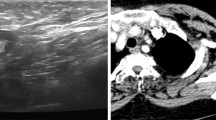Abstract
The purpose of this study is to evaluate the accuracy of gray scale and Doppler US findings in the detection of axillary metastases in breast cancer patients with no palpable lymph nodes. One-hundred and ninety-eight lymph nodes detected in 83 women were evaluated. The size and longitudinal/transverse axis ratios of each node were documented. Absence of echogenic hilum, asymmetrical cortical thickening, and presence of peripheral flow were prospectively considered signs of malignancy. Histopathologically, there were 93 malignant and 105 benign nodes. The above criteria and a low longitudinal-transverse axis ratio were statistically significant for malignancy. In lymph nodes smaller than 1 cm, only asymmetric cortical thickening and presence of peripheral flow were significant. The sensitivity, specificity, positive predictive value, negative predictive value and accuracy of US were 86.49, 93.62, 91.43, 89.8 and 90.48%, respectively. In conclusion, US is successful and reliable in the determination of axillary metastatic involvement in nonpalpable and small lymph nodes. Inclusion of axillary US in the preoperative diagnostic evaluation would be complimentary to sentinel node biopsy, and also could eliminate the need for it in patients with positive US results, after confirmation with biopsy.




Similar content being viewed by others
References
Sato K, Tamaki K, Tsuda H, Kosuda S, Kusano S, Hiraide H, Mochizuki H (2004) Utility of axillary ultrasound examination to select breast cancer patients suited for optimal sentinel node biopsy. Am J Surg 187(6):679–683
Deurloo EE, Tanis PJ, Gilhuijs KGA, Muller SH, Kröger R, Peterse JL, Rutgers EJ, Valdes Olmos R, Schultze Kool LJ (2003) Reduction in the number of sentinel lymph node procedures by preoperative ultrasonography of the axilla in breast cancer. Eur J Cancer 39(8):1068–1073
Ivens D, Hoe AL, Podd TJ, Hamilton CR, Taylor I, Royle GT (1992) Assessment of morbidity from complete axillary dissection. Br J Cancer 66:136–138
Krag D, Weaver T, Ahikaga T (1998) The sentinel node in breast cancer: a multicenter validation study. N Engl J Med 339:941–946
Cody HS, Hill KN, Tran E (1999) Credentialing for breast lymphatic mapping: how many cases are enough? Ann Surg 229:723–728
Pamilo M, Soiva M, Lavast EM (1989) Real-time ultrasound, axillary mammography, and clinical examination in the detection of axillary lymph node metastases in breast cancer patients. J Ultrasound Med 8:115–120
Vassallo P, Wernecke K, Roos N, Peters PE (1992) Differentiation of benign from malignant superficial lymphadenopathy: the role of high-resolution US. Radiology 183:215–220
Feu J, Tressera F, Fabregas R, Navarro B, Grases PJ, Suris JC, Fernandez-Cid A (1997) Metastatic breast carcinoma in axillary lymph nodes: in vitro US detection. Radiology 205:831–835
Tschammler A, Ott G, Schang T, Seelbach-Goebel B, Schwager K, Hahn D (1998) Lymphadenopathy: differentiation of benign from malignant disease–color Doppler US assessment of intranodal angioarchitecture. Radiology 208:117–123
Yang WT, Chang J, Metreweli C (2000) Patients with breast cancer: differences in color flow and gray-scale US features of benign and malignant axillary lymph nodes. Radiology 215:568–573
Yang WT, Metreweli C, Lam PKW, Chang J (2001) Benign and malignant breast masses and axillary nodes: evaluation with echo-enhanced color power Doppler US. Radiology 220:795–802
Vaidya JS, Vyas JJ, Thakur MH, Khandel-wal KC, Mittra I (1996) Role of ultrasonography to detect axillary node involvement in operable breast cancer. Eur J Surg Oncol 22:140–143
Tate JJT, Lewis V, Archer T, Guyer PG, Royle GT, Tayls I (1989) Ultrasound detection of axillary lymph node metastases in breast cancer. Eur J Surg Oncol 15:139–141
Yang WT, Ahuja AT, Tang A, Suen M, King W, Metreweli C (1996) High frequency ultrasound detection of axillary lymph node metastases in breast cancer. J Ultrasound Med 15:241–246
Krishnamurthy S, Sneige N, Bedi DG, Edieken BS, Fornage BD, Kuerer HM, Singletary SE, Hunt KK (2002) Role of ultrasound-guided fine-needle aspiration of indeterminate and suspicious axillary lymph nodes in the initial staging of breast carcinoma. Cancer 95(5):982–988
Kanter AY, Eijck HJ, Geel AN, Kruijt RH, Henzen SC, Paul MA, Eggermont AMM, Wiggers T (1999) Multicentre study of ultrasonograpically guided axillary node biopsy in patients with breast cancer. Br J Surg 86:1459–1462
Bonnema J, van Geel AN, Ooijen B, Mali SPM, Tijam SL, Henzen-Logmans SC, Schmitz PIM, Wiggers T (1997) Ultrasound-guided aspiration biopsy for detection of nonpalpable axillary node metastases in breast cancer patients: new diagnostic method. World J Surg 21:270–274
Veronesi U, Paganelli G, Galimberti V (1997) Sentinel-node biopsy to avoid axillary dissection in breast cancer with clinically negative lymph nodes. Lancet 349:1864–1867
Veronesi U, Galimberti S, Zurrida S (2001) Sentinel lymph node biopsy as an indicator for axillary dissection in early breast cancer. Eur J Cancer 37:454–458
Giuliano AE, Haigh PI, Breennan MB (2000) Prospective observational study of sentinel lymphadenectomy without further axillary dissection in patients with sentinel node negative breast cancer. J Clin Oncol 18:2553–2559
Estourgie SH, Nieweg OE, Olmos RAV, Rutgers EJ, Peterse JL, Kroon BBR (2003) Eight false negative sentinel node procedures in breast cancer: what went wrong? Eur J Surg Oncol 29:336–340
Estourgie SH, Nieweg OE, Rutgers EJ, Kroon BBR (2003) What is a false-negative result for sentinel node procedures in breast cancer? J Surg Oncol 82:141–142
Bruneton JN, Caramella E, Hery M, Aubanel D, Manzino JJ, Picard JL (1986) Axillary lymph node metastases in breast cancer: preoperative detection with US. Radiology 158:325–326
Freitas R, Costa MV, Schneider SV, Nicolau MA, Marussi E (1991) Accuracy of ultrasound and clinical examination in the diagnosis of axillary lymph node metastases in breast cancer. Eur J Surg Oncol 17:240–244
MacMillan RD, Rampaul RS, Lewis S, Evans AJ (2004) Preoperative ultrasound-guided node biopsy and sentinel node augmented node sample is best practice. Eur J Cancer 40(2):176–178
March DE, Wechsler RJ, Kurtz AB (1991) CT pathologic correlation of axillary lymph nodes in breast carcinoma. J Comput Assist Tomogr 15:440–444
Lam WW, Yang WT, Chan YL, Stewart IE, Metreweli C, King W (1996) Detection of axillary lymph node metastases in breast carcinoma by technetium-99 m sestamibi breast scintigraphy, ultrasound and conventional mammography. Eur J Nucl Med 23(5):498–503
Mumtaz H, Hall-Craggs MA, Davidson T (1997) Staging of symptomatic primary breast cancer with MR imaging. Am J Roentgenol 169:417–424
Mussurakis S, Buckley DL, Horsman A (1997) Prediction of axillary lymph node status in invasive breast cancer with dynamic contrast-enhanced MR imaging. Radiology 203:317–321
Uematsu T, Sano M, Homma K (2001) In vitro high resolution helical CT of small axillary lymph nodes in patients with breast cancer: correlation of CT and histology. Am J Roentgenol 176:1069–1074
Yang WT, Ahuja A, Tang A, Suen M, King W, Metreweli C (1995) Ultrasonographic demonstration of normal axillary lymph nodes: a learning curve. J Ultrasound Med 14:823–827
Tschammler A, Wirkner H, Ott G, Hahn D (1996) Vascular patterns in reactive and malignant lymphadenopathy. Eur Radiol 6:473–480
Chang DB, Yuan A, Yu CJ, Luh KT, Kuo SH, Yang PC (1994) Differentiation of benign and malignant cervical lymph nodes with color Doppler sonography. Am J Roentgenol 162:965–968
Kubek KA, Chan L, Frazier TG (1996) Color Doppler flow as an indicator of nodal metastasis in solid breast masses. J Ultrasound Med 15:835–841
Giovagnorio F, Rusticali A, Araneo AL (1997) Color and pulsed Doppler evaluation of benign and malignant adenopathy. Clin Imaging 21:163–169
Yang WT, Metreweli C (1998) Color Doppler flow in normal axillary lymph nodes. Br J Radiol 71:381–383
Acknowledgments
This study was supported by the Research Fund of the University of Istanbul. Project number: 415/25012005.
Author information
Authors and Affiliations
Corresponding author
Rights and permissions
About this article
Cite this article
Esen, G., Gurses, B., Yilmaz, M.H. et al. Gray scale and power Doppler US in the preoperative evaluation of axillary metastases in breast cancer patients with no palpable lymph nodes. Eur Radiol 15, 1215–1223 (2005). https://doi.org/10.1007/s00330-004-2605-9
Received:
Revised:
Accepted:
Published:
Issue Date:
DOI: https://doi.org/10.1007/s00330-004-2605-9




